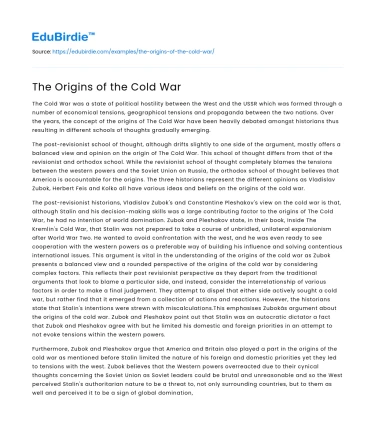The Cold War was a state of political hostility between the West and the USSR which was formed through a number of economical tensions, geographical tensions and propaganda between the two nations. Over the years, the concept of the origins of The Cold War have been heavily debated amongst historians thus resulting in different schools of thoughts gradually emerging.
The post-revisionist school of thought, although drifts slightly to one side of the argument, mostly offers a balanced view and opinion on the origin of The Cold War. This school of thought differs from that of the revisionist and orthodox school. While the revisionist school of thought completely blames the tensions between the western powers and the Soviet Union on Russia, the orthodox school of thought believes that America is accountable for the origins. The three historians represent the different opinions as Vladislav Zubok, Herbert Feis and Kolko all have various ideas and beliefs on the origins of the cold war.
Save your time!
We can take care of your essay
- Proper editing and formatting
- Free revision, title page, and bibliography
- Flexible prices and money-back guarantee
The post-revisionist historians, Vladislav Zubok's and Constantine Pleshakov's view on the cold war is that, although Stalin and his decision-making skills was a large contributing factor to the origins of The Cold War, he had no intention of world domination. Zubok and Pleshakov state, in their book, Inside The Kremlin's Cold War, that Stalin was not prepared to take a course of unbridled, unilateral expansionism after World War Two. He wanted to avoid confrontation with the west, and he was even ready to see cooperation with the western powers as a preferable way of building his influence and solving contentious international issues. This argument is vital in the understanding of the origins of the cold war as Zubok presents a balanced view and a rounded perspective of the origins of the cold war by considering complex factors. This reflects their post revisionist perspective as they depart from the traditional arguments that look to blame a particular side, and instead, consider the interrelationship of various factors in order to make a final judgement. They attempt to dispel that either side actively sought a cold war, but rather find that it emerged from a collection of actions and reactions. However, the historians state that Stalin's intentions were strewn with miscalculations.This emphasises Zubokâs argument about the origins of the cold war. Zubok and Pleshakov point out that Stalin was an autocratic dictator a fact that Zubok and Pleshakov agree with but he limited his domestic and foreign priorities in an attempt to not evoke tensions within the western powers.
Furthermore, Zubok and Pleshakov argue that America and Britain also played a part in the origins of the cold war as mentioned before Stalin limited the nature of his foreign and domestic priorities yet they led to tensions with the west. Zubok believes that the Western powers overreacted due to their cynical thoughts concerning the Soviet Union as Soviet leaders could be brutal and unreasonable and so the West perceived Stalin's authoritarian nature to be a threat to, not only surrounding countries, but to them as well and perceived it to be a sign of global domination, thus heightening the tensions between the West and the USSR. Zubok argument suggests that Stalin miscalculated the results of his plan resulting in the rising tensions between the western powers and the USSR and so although Stalin was primarily to blame for the origins of The Cold War, western powers contributed to the hostility between the two nations due to their pessimistic views concerning Russia and Stalin.
In comparison to this, the revisionist, Herbert Feis, believed that Russia and Stalin were solely to blame for the origins of the cold war. He claimed that Stalin did indeed have intentions for global domination and that he believes Stalin corrupted and manipulated the intentions and needs of the Russian people as he states that both Churchill and Roosevelt were correct in saying the Russian people needed moral law, freedom, and a balance of power. Feis states under Stalin, they were only trying to extend their boundaries and their control over neighbouring states but also beginning to revert their revolutionary effort throughout the world. For Feis, the key features of the origins of the Cold War were the nature of which Stalin presented himself and the exploitation of the Russian people, convincing them that Russia would benefit from Stalin's expansionist ideas and beliefs.
In addition to this Feis argues that Stalin and the Russians were exploiting their chance to organise the country. The historian stated that under the Declaration of Liberated Europe, all three allies agreed to the liberation of Austria. However, this was disregarded by the Soviet Union as they recognised Renner's group as the provisional government. Due to this, tensions began to arise between the western powers and Soviet Russia as both America and Britain refused to do the same as Russia. This argument reflects Feis's revisionist thoughts as his argument suggests that the USSR were trying to gain power over Austria through a way that, although seemed harmless, could have been potentially devastating for Austrian residence as Stalin tried to add Austria as a country with communism, thus representing his expansionist desires and his aims to spread communism throughout the world.






 Stuck on your essay?
Stuck on your essay?

